#trauma expressing itself in different ways...i find both of these characters extremely fascinating to look at in that way
Explore tagged Tumblr posts
Note
killshot anon! YEAH i totally agree w/ your view on kaeya. it's so weird to me that people will blame him for his role in a situation he was forced into as a child through no choice of his own. that itself had to be traumatic, not to mention everything that happened later. i hate when people say he's untrustworthy - like yeah, he's lied, so has everyone? it's clear he does it mostly to protect himself. not to mention that (& sadism) can be symptoms of trauma. kaeya deserves nothing but happiness
take a seat folks it’s time for a “brynn should’ve been an english major” lesson! today we’re gonna learn some literary theory; specifically, we’re gonna apply psychoanalytical trauma theory to kaeya’s backstory and current character. killshot anon i bet you never thought this would result in a whole ass essay.
disclaimer one! you are allowed to dislike kaeya! i am not saying you need to like him or his character, you’re entitled to your opinion and i’m not here to change your mind.
disclaimer two! i am in no way an expert and this is all for fun! this is just my silly little analysis of one of my favorite characters as someone who’s studied literary theory and rhetoric and can also apply personal experience. seriously analysis is like a hobby to me and this is just an excuse for me to ramble about kaeya.
disclaimer three! this contains lots of spoilers! basically for everything we know in-game, general knowledge as well as stuff from his voicelines and character story. don’t read this if you don’t want spoilers.
since this is going to be filled with spoilers and is about to get really long, everything will be under a cut. for those who wanna read my dumb super informal essay: enjoy!
final note: yeah this is over 2000 words long can you tell i like analysis
⭒
let’s start by getting a quick rundown of trauma theory out of the way. to begin, what is “trauma?” in this case, trauma is going to refer to an experience that greatly affects and changes one’s life; attitudes, memories, behaviors, mental state, etc. while not all changes may be bad, per se, the overall effect of trauma is generally a negative one, which is why it’s so significant. literary trauma theory, then, explores these changes and the impact of trauma in literature. it analyzes the psychological and social effects of trauma, explaining what those effects are and why they happen. in the context of a specific character, trauma theory breaks down said character’s behaviors, feelings, and general mentality in relation to their past experiences; trauma theory hopes to explain to others the reasons for why a character may act or feel the way they do, all based upon the character’s experiences, particularly traumatic ones. our character today is the lovely kaeya alberich, with the “literature” being genshin impact. i’ll be referencing kaeya’s wiki page to ensure i get all details correct for his character story and voicelines.
it would be good to review kaeya’s backstory before delving into the actual analysis. though we don’t know much about his life before living in mondstadt, we’re told he was sent as an agent of khaenri’ah. and by “sent,” i mean his biological father abandoned him in a completely unfamiliar land to serve khaenri’ah’s interests and fullfil his mission—what this entirely entails hasn’t been revealed. mondstadt, however, welcomed kaeya “with open arms when they found him.” crepus ragnvindr took him in as his adopted son, with diluc as his adopted brother. kaeya and diluc were “almost like twins,” so close they “[knew] each other’s thoughts and intentions without a word.” he’d began a new life in mondstadt, one surrounded by friends and family that loved him; one that was completely shattered by crepus’s death. kaeya arrived at the scene of the disaster, and was led to believe diluc was the one who killed their father to “set his father free” from the effects of his delusion. there’d always been one big question in kaeya’s life: if it came down to it, who would he support? the nation that abandoned him, but he still felt loyal to, or the nation and family that took him in and really loved him? overrun with guilt, kaeya confessed his purpose to diluc, sparking a fight between the two brothers. in this fight, kaeya receives his cryo vision. though both brothers stepped away alive, they’ve never been able to make peace with one another. now, kaeya is the eccentric and charming cavalry captain of the knights of favonius; a man who gets his way by using any means necessary, regardless of whether or not it seems right.
kaeya’s not evil; he’s morally ambiguous, and that stems from what appears to be a general distrust of others. his life is one shrouded in secrecy. from the moment he stepped foot into mondstadt, he was surrounded by secrets. even now, he doesn’t talk about a lot of things, namely his past, vision, and feelings. though he’s always willing to get information out of others, kaeya never reveals anything about himself. he repeatedly tells the player they can confide in him, but whenever you try and pry into his life, he deflects your questions with some sort of witty comment or flirty remark. anything he does reveal is vague, or spoken in some sort of “code.” for example, his “interesting things” voiceline. he tells us about the owl of dragonspine, how it “seems to look right through you, while letting go of none of its own secrets,” and then tacks on a “quite fascinating, don’t you think?” it seems like an awfully accurate parallel to himself; kaeya does all he can to get information from others, but never gives anything about himself. now, this whole thing—his relationship with diluc falling apart and his need for secrecy—could have probably been avoided if he had just come clean about his mission years ago. so why didn’t he? to start, kaeya was a literal child. not only are children unable to properly tell the difference between right and wrong, but they’ll also typically follow their parents’ orders blindly. kaeya had just been abandoned, and he wouldn’t want to risk being cast out by mondstadt as well if he came clean right away. you see, there’s this thing about trauma, something that trauma theory states. traumatized people feel a sort of shame or guilt regarding their traumatic experience; they’ll keep quiet because they don’t want to cause problems or bother others with their issues. of course kaeya wouldn’t tell the truth about his past, he doesn’t want to destroy the genuinely loving relationships he’d built in mondstadt. his fight with diluc only proves what he was afraid of: if he’s honest, he’ll be abandoned again. and if kaeya’s used to all the lies, why should he bother changing?
another thing, if he’s not going to tell the truth, then why would he have initially gone along with his father’s plans? again, he was a child. he really had no choice, and was forced into a very wrong and cruel situation. there’s a good explanation for this, too, which is also stated in trauma theory; traumatized people will still do their best to please their abusers. especially if said abuser is a parent, that will drive traumatized people to work even harder to please them. although his father hurt him by ruthlessly abandoning him, kaeya still sought to make him and his homeland proud. he was willing to be used as a tool for their gain; that is, until he found people who actually cared about him. he was an impressionable child, of course he’s going to obey orders. but as he gets older, he feels torn. does he serve those who abandoned him, or those that took him in? his father—and arguably, khaenri’ah as a whole—hurt him, sure, but he still feels some loyalty and connection to his former home. instead of revealing anything, he lets the situation play out. that way, he can’t be blamed when things fall apart.
the thing about claiming he’s untrustworthy is that hardly anyone in-game believes that. he’s adored by the older folks in mondstadt, and foes and allies alike find him easy to talk to. despite seeming lazy and uninterested in work, kaeya takes his job very seriously. in fact, his story states that crepus’s death was the “first and only time kaeya failed in his duty.” the “only time” is especially important, because it signifies kaeya still fulfills his duties successfully. he’s had a total of one slip-up, and hasn’t failed since. no, kaeya is not untrustworthy. rather, kaeya finds everyone else untrustworthy. it’s not unlikely that this is a direct consequence of being abandoned as a child. although it’s been established that kaeya and diluc were very close as children, when crepus dies, kaeya assumes diluc is the one that killed him. in order to jump to such an extreme conclusion against someone he was so close to, there had to be some underlying sense of distrust. furthermore, kaeya expresses feeling as though he doesn’t belong anywhere. he was abandoned by khaenri’ah, and then worried he wouldn’t be accepted by mondstadt. he is, but there’s still that worry. if you place him in your teapot as a companion, he tells you that your home feels like someplace he belongs, following it up with a “heh, who’d have thought…” kaeya still feels as though he doesn’t belong in mondstadt; despite the fact that he’s a high-ranking knight of favonius and rather popular, he still feels like an outsider. he doesn’t trust that anyone actually wants him around, and he finds joy in testing peoples’ trustworthiness. it’s noted in his story and through his voicelines that the beloved cavalry captain has a rather sadistic nature. he likes putting people into difficult situations, to see what decisions they will make. he does this to both opponents and allies, testing to see who’s going to back out and who’ll keep fighting; in the sake of allies, who can he trust? or who will turn tail and abandon their teammates at the slightest hint of danger? i mentioned it previously, but kaeya doesn’t care what measures he has to take so long as his job gets done and he gets the answers he wants. it’s a sort of self-preserving mindset, putting himself above the safety of others. kaeya’s trying to protect himself, which makes sense with all he’s been through. he doesn’t want to be hurt, and instead finds pleasure in threatening harm upon others. it’s twisted, sure, but it’s because he can only trust himself in a world that he believes is out to get him. he’s got as many enemies—if not more—as he does allies; of course kaeya focuses on protecting himself first, whether physically or through keeping his secrets, well, secret.
his most obvious traumatic effect is definitely his alcoholism. but he uses it as a distraction, not just to wallow in self-pity. this is seen again in his story, particularly in story 3. it’s found that when his favorite drink, death after noon, is out of season, mondstadt’s crime rate is decreased drastically. at face value, this just means kaeya spends more time working when death after noon is low in supply. but kaeya doesn’t skip work to go to taverns; it’s already been established he takes his job very seriously, so this means he actually patrols and tracks down threats while off work when he can’t indulge in his favorite alcoholic drink. he doesn’t get drunk simply because he’s depressed. if he did, there wouldn’t be a drop in incidents when death after noon is out of season. no, kaeya uses both the alcohol and fighting to distract himself. after all, it’s a little hard to think about feeling sad when you’re either drunk out of your mind or fighting for your life.
despite being so secretive, kaeya gives us glimpses of his true emotions from time to time. as previously mentioned, his flirty attitude is nothing more than a mask to hide how he really feels; and kaeya is terribly, terribly lonely. that may be why he seems so extroverted. constantly being around people should, logically, drive away that feeling, but it doesn’t work like that. when he talks with the player, he frequently expresses disappointment when you have to leave. each time, though, he dampens the weight of his words with playful or flirty language. he’s lonely, but doesn’t want you to know that, like he’s afraid of asking you to stay. he takes the seriousness of his feelings, and basically bends it into some sort of lighthearted joke. kaeya hides his true feelings—negative feelings, to be exact—so that he doesn’t bother anyone. which is, again, something that happens with traumatized people. he displays that hesitance to reveal his true feelings, because there’s a shame or guilt that comes with his past. he doesn’t want to bother others or hold them back, so he puts on a smile and amps up the charisma. one other very important thing—but very small detail—i would like to note is his feelings toward family. his fell apart not even once, but twice, and kaeya still holds familial relationships in high regard. we know he doesn’t exactly care how he goes about getting his work done. he doesn’t pay attention to what’s “right” or “wrong,” so long as he gets what he needs. but one of his informants, vile, notes that the cavalry captain has one exception: he won’t work with those who threaten others’ families. in fact, kaeya claims those who do should be hunted down and destroyed. even though his own families have caused him so much pain—and he ended up estranged from both—he still understands the importance of having people who love you in your life. because he didn’t get that.
kaeya’s not evil. ultimately, as a knight of favonius, his goal is to protect others, because no one was there to protect him. and because no one was there to protect him, because he’s been hurt time and time again by people who were supposed to love him, kaeya has taken to protecting himself. he hides any and all negative feelings with a charismatic, friendly façade, because he thinks it’ll drive away his persistent loneliness. any “bad” actions of his were hardly his fault; he was forced into a life of secrecy and lies, and then abandoned by the first people who truly loved him. kaeya’s a multi-faceted, tragic character, one that toes the line between good and evil, and that’s what makes him so interesting.
#brynn yells#brynn answers#killshot anon#brynn's writing#genshin#genshin impact#kaeya#kaeya alberich#genshin kaeya
226 notes
·
View notes
Text
Best shows I watched in 2020
I wanted to look at some shows I watched that I felt had some of the best writing. Most of these shows did not come out in 2020 but are shows that definitely deserve some attention for their masterful writing. Minor spoilers below.
1.Succession
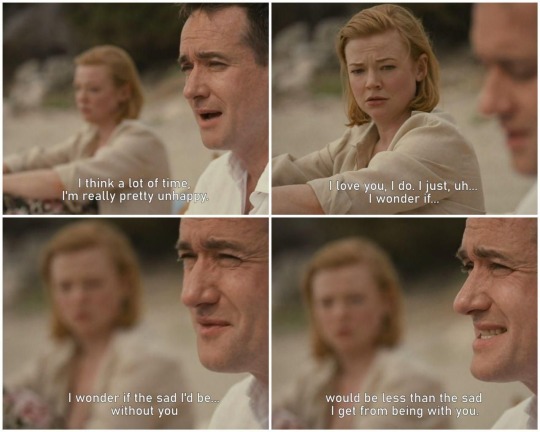
This show took me by complete surprise. While I love stories about complicated, and darker characters I went into this show expecting it to be a classic story about power dynamics among the rich. And it is but the show is really about cycles of abuse and trauma and how that relates to a capitalist system. The show follows the children of billionaire Logan Roy as they continuously jostle for power within the family company, it’s very Shakespearian in nature but also one of the most absurd and hilarious shows on.
The writing on this show is very interesting because none of the characters can actually say what they want to say, it is all disguised such as a politician’s word choices would be. And bringing that veiled rhetoric into a family dynamic makes for an exploration of power and manipulation. The writing is also significant for doing something called by the cast, “the language of strength” which is using aggressive and sexually charged language frequently, this is used both in the company and within the family as both intimidation and to show off. There’s really a lot to dissect in word choice and meaning in this show and for that reason it is fascinating.
2. Hannibal
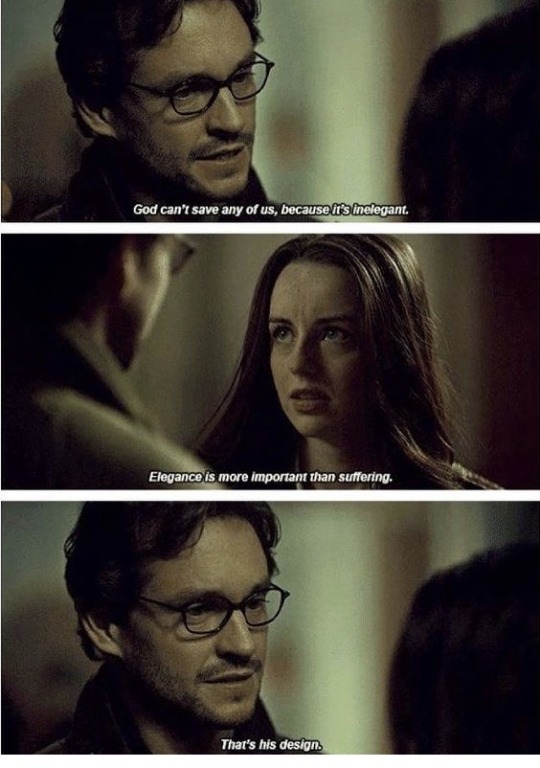
This was another show I didn’t expect to like but was pleasantly surprised by. This show ended its series in 2015 but it has always been a cult favorite and has been receiving renewed attention as of late and all I can say is thank god. This is a brilliant show both visually and story-wise. As I watched the first season I felt like I was stepping into a different world of just complete madness, and the show is really escapism in that way even though it features horrific deaths every episode. While I don’t think this is the best written show out of all the ones listed here, and I do think it expresses itself more through visual prose rather than words it is still reminiscent of a dark epic poem.
The show follows FBI consultant Will Graham as he investigates a series of grisly murders and comes across the path of notable psychiatrist Hannibal Lecter (also notable cannibal and serial killer). The writing is very interesting due to it’s plentiful of metaphors. In regards to the main relationship between Will and Hannibal the distinctions between wanting to “eat” one’s love and wanting to be with them are really interesting and the word choices made can only be called poetic.
3. Atlanta
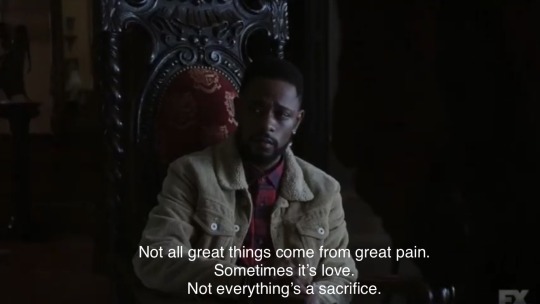
I went on a Donald Glover kick after finishing Community and I’m so happy I did because it led me to this show. Many have called this show “what TV could be” and it really is. This show starts off simply enough with the story of Earn trying to become a music agent for his cousin, the rapper Paper Boi. But the show delves deeply into the surreal in order to illustrate its points about poverty and being black in America.
The writing on this show bucks traditional story structure completely with each episode being more of a “day-in-the life” rather than a continuous plot driven towards a goal, this allows for much more experimentation but also the feeling that no matter what the characters do they’re going to get weighed down in some way or other. This disregard for classic show structure also bleeds into the genre, it’s hard to solely classify this show as a comedy because there are so many elements of horror, drama, and satire within it. The writing is overall beautiful, heartbreaking, and hilarious. This show is a must watch as it is probably the best thing on TV right now.
4. Ramy
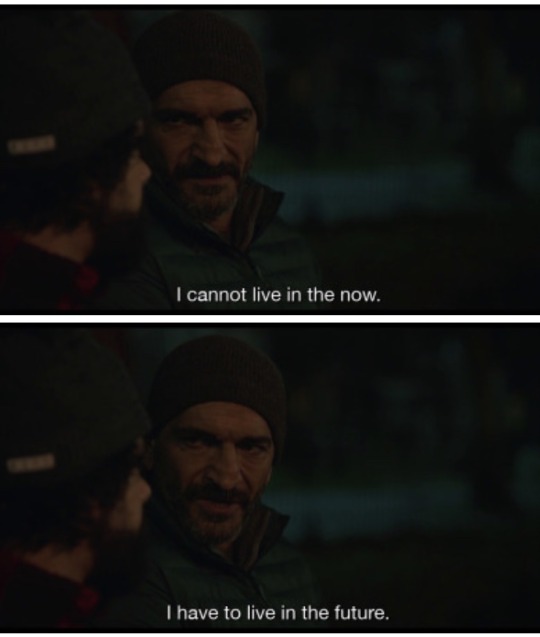
This show is the spiritual successor to shows like Atlanta and Fleabag who have paved the way for this new brand of comedy show, often focused around a single character as they try to better their lives. Ramy is a show about a Muslim- American milennial who is trying to get more in touch with his religion, thinking that it will help him to get his life on track. While the humor can be brass and the story lines can get pretty weird and disgusting the first word I think of with this show is delicate.
Especially in its second season, which has moved away from Ramy’s perspective to focus on the rest of his family. The writing in this show can swing from a really fragile sense of beauty to super crass and sexual in the blink of the eye, which makes it so hilarious and interesting to watch. The writers have complied a series of character studies under the guise of a TV show, and watching this family deal with issues of assimilation, lost dreams, religion, and loneliness makes the watcher feel deeply connected to them.There’s a lot of stuff happening in this show that is very fragile but very moving and also hilarious.
5. The Great
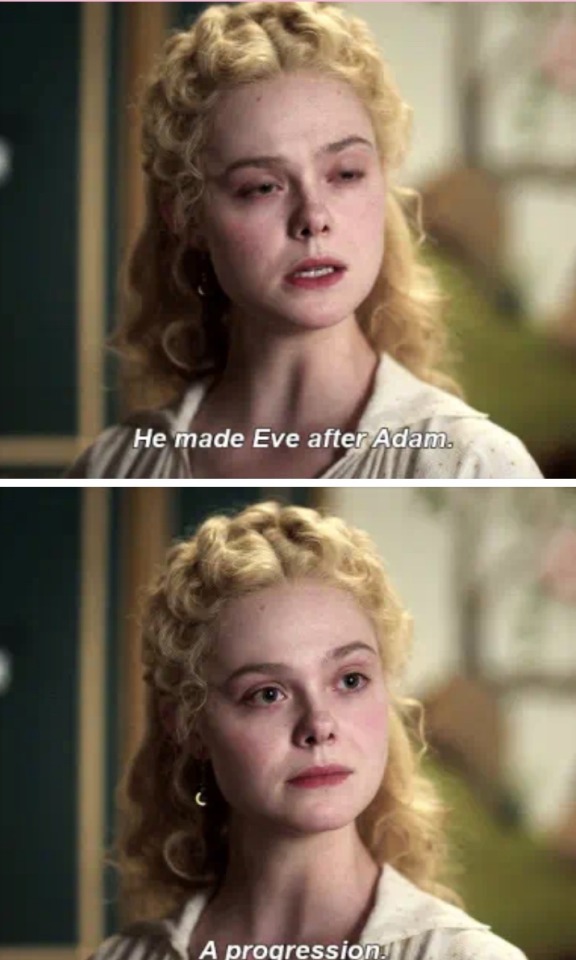
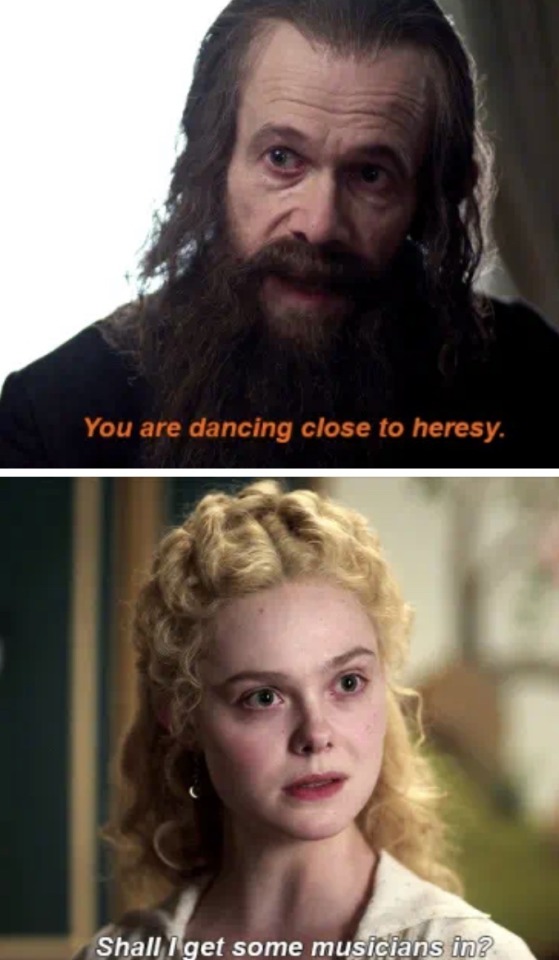
This show is chaos embodied. From excessive violence, sex, and rampant and ridiculous abuse of power this comedy which is extremely loosely based on Catherine the great’s life is a real ride. It was created by the writer of The Favourite and interacts with absurdity and power in similar ways.
The writing is really interesting because it is so crass. In that way it is meant to be humorous but also terrifying. Many things in this show act in more than one way- Peter (Russia’s emperor) is terrifying, ridiculous, and lovable sometimes all within a single scene. And this ability to be all of these things makes this a very good examination of power.
6. Veep
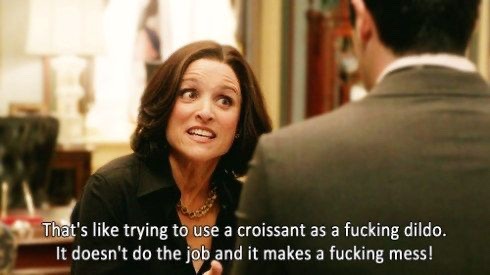
This is how you do a villain arc. Perhaps the best and most honest show about American politics Veep focuses on Selina Meyer, the first female Vice President who is surrounded by the most competent incompetent people and virtually powerless and unfulfilled in her job. Throughout the seven seasons we follow her through presidential campaigns and personal woes all in classic dark comedy style. While this show is first and foremost a comedy it is not afraid, as it’s ending shows, to dig into dark themes and character exploration of a narcissist with a bottomless thirst for power going after the highest office in the country.
This show predates the Trumpian era America currently finds itself in but much of it’s subject matter and even specific plot points have come to be echoed in our current history. Such as an election depending on the results out of Nevada and a politician’s base protesting to “Count the vote” and “Stop the count”. This just proves that the show is so in-touch with the reality of American politics (even when the show was just a satire rather than the bleak truth). This is a perfect dark comedy with excellent, well-crafted characters, and solid plot points. Definitely a must watch for anyone.
#best shows 2020#hannibal#veep#the great#succession#ramy#atlanta#ramy fx#atlanta fx#writing#screenwriting#tv shows#best tv shows#power
123 notes
·
View notes
Text
Girl Kills World
Everyone who’s into movies has a thing. A thing that is endlessly fascinating and that can be refracted through a thousand different lenses. One friend of mine has a deep and abiding love of schlocky horror movies. Loves ‘em, can’t get enough of ‘em. They’re his happy place, and whenever he’s having a tough day, a small scotch and a viewing of Motel Hell will perk him right up.
My thing is comedians playing villains. However, let me be clear. If a comedian or comedic actor is playing a comedic villain, that doesn’t scratch the itch. Instead, when a funnyman plays a real nasty piece of work, my movie sense starts tingling. James Belushi, a guy not exactly known for having a wide range, is highly entertaining as a murderous redneck in Retroactive. Michael Keaton, who made his bones as a skilled comic actor, did excellent work as a conniving tenant from Hell in Pacific Heights and as a vicious convict in Desperate Measures.
For me, the apex of this can only be Robin Williams. A look at his filmography shows many, many roles where he played a benevolent motormouth. That’s true, yet despite having won an Academy Award, I don’t think Williams has ever been properly appreciated as either a skilled dramatic actor or as an effective villain. In Insomnia, he does subtle work as a fledgling serial killer bedeviling Al Pacino. His performance in One Hour Photo as an obsessive photo technician is simultaneously creepy and tragic.
Williams casts a long shadow as a comedian, a philanthropist, a dramatist, and a scary as hell bad guy. He gave others the courage to light their cinematic image on fire, and I rejoice when I see actors take a crack at this sort of thing. Genial funnyman and FOS* Kevin James has stepped up to the plate to play a villainous creep in Becky, and while it doesn’t always work, I admire his taking a chance.
Thirteen is a tough age for anyone. For Becky (Lulu Wilson), it’s even tougher than normal. She’s getting bullied at school. She has a habit of shoplifting. Her mother has been dead for over a year. Her father Jeff (Joel McHale) has been dating, and as you can imagine, Becky isn’t super thrilled by that. The one aspect of stability in her life is her two dogs, the sweet Dora and the protective Diego. Everything else seems to be in a state of flux.
Jeff loves Becky and wants to do right by her, but he thinks it’s time for the family to move forward. After pulling her out of school early, he drives her to the family’s lake house. His girlfriend Kayla (Amanda Brugel) is waiting for them, along with her young son, Ty (Isaiah Rockcliffe). During dinner, the truth comes out — Jeff has asked Kayla to marry him.
To put it lightly, this news does not go over well with Becky. She storms out of the house and, followed by Diego, she sequesters herself in a secluded clubhouse. As temper tantrums go, her timing couldn’t be better. That’s because she’s not home to be introduced to Dominick (Kevin James). He tells Jeff and Kayla his dog has gone missing. He’s lying.
It turns out that Dominick is both a neo-Nazi and an escaped convict, which is not an ideal combination. He’s joined by the conflicted Apex (Robert Maillet), the mouthy Cole (Ryan McDonald), and the personality-free Hammond (James McDougall). They’re looking for a key hidden somewhere on the property. They’re willing to get very rough. The only one who can stop them is an extremely resourceful and extremely angry girl.
Much like the title character, Becky is short, inventive, and incredibly mean. Directors Jonathan Milott and Cary Murnion are laser-focused on delivering a home invasion thriller that features jaw-dropping gore.** It kind of works. The upside to the film is that there are some inventive and wildly violent set pieces. Once we’re settled in at the lake house, the pacing is quick and efficient. If you’re in the market for a movie in which a tween absolutely annihilates a bunch of white supremacists, you’ll find that here. The bad news is that Milott and Murnion don’t do a great job of establishing the geography of the house and the surrounding property. How big is the house itself? Where is the treehouse in relation to the patio and Becky’s treehouse? There are multiple scenes of people hauling ass through the woods, yet I never had any idea where characters were in relation to each other.
The screenplay, by Lane Skye, Ruckus Skye, and Nick Morris, additionally has its ups and downs. At times it feels a little like an edgelord version of Home Alone, and the characterization of Becky herself is a little iffy. I get that she’s going through a difficult time, but when she cuts through the neo-Nazis like Junior Jason Vorhees and we’re told it’s due to her anger, it seems like the script is saying that Becky is ultimately a psychopath. Is she? Was she always this way and this just gave her a chance to blossom? Having said that, a lesser screenplay would have wasted precious real estate in showing us in exacting detail what Dominick’s precious key is actually for. The Skyes and Morris know that it doesn’t really matter whether the key unlocks a vault or the Ark of the Covenant, only that it’s important to Dominick. I liked that.
By and large, the cast is pretty good. As Becky, Lulu Wilson doesn’t have a ton to work with, but she sells the seething anger of her character. Wilson has these wide, expressive eyes, and she’s able to shift them from curiosity to fear to rage. It’s an impressive performance from such a young actor. Overall, I liked Kevin James as Dominick. He knows that to be an effective villain, stillness and quiet can be more effective than ranting. When his character is behaving in a normal and reasonable way, James comes off as creepy. We’re told that, over time, his character has taken a number of people under his wing. However, Dominick never quite feels like he has the cult leader charisma of a Charles Manson. In the end, he’s just a guy with a bunch of Nazi tattoos.
To me, the real standout performance is an understated one, and it’s by Robert Maillet as the henchman Apex. Early on, his character commits an appalling act. We can see the guilt from that weighing on him, and we can see his fear that he’s in over his head and unable to prevent another atrocity from taking place. Maillet is a big guy, and he uses his size and body language in an interesting way. He almost seems to shrink from the clearly smaller Dominick, and he never makes eye contact for long with the hostages in the house. I appreciated the nuance that he brought to what could have been a thankless role.
It never would have occurred to me to make a tweenage Die Hard where the heavy is the guy from The King of Queens, and be expected to take it all seriously. At the end of the day, Becky is a pretty good revenge thriller, and I’m pleased that everyone involved was committed to bringing this little film to bloodthirsty life.
*Friend of Sandler
**Fair warning, if you like eye trauma, you’ll adore this movie.
from Blog https://ondenver.com/girl-kills-world/
0 notes